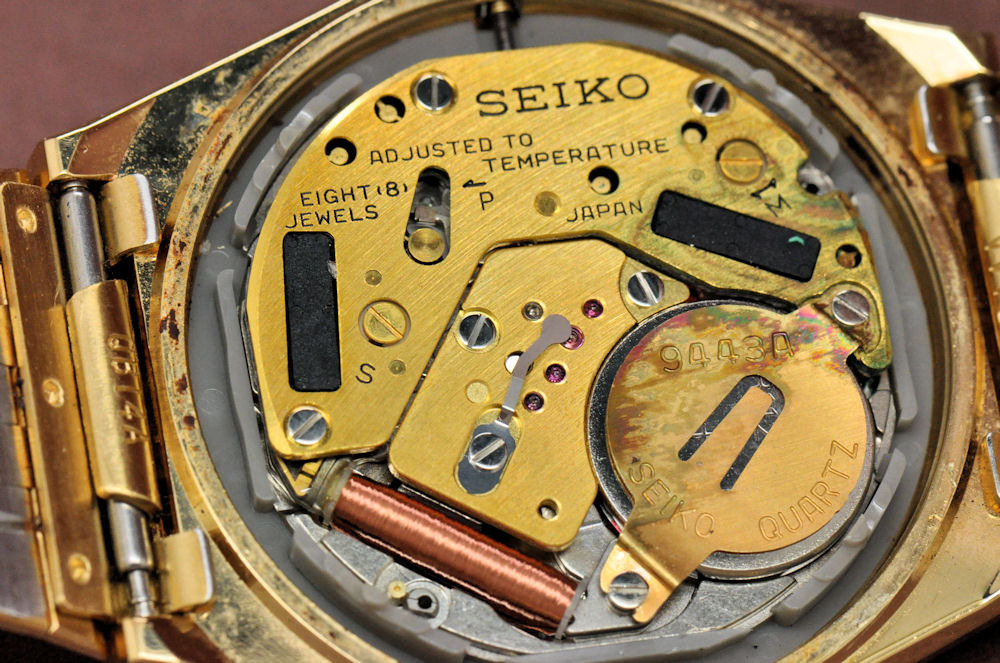A watch battery can leak for a variety of reasons, even when the battery is dead. This is a particular problem for alkaline batteries, as they may leak a corrosive substance called potassium hydroxide.
All alkaline batteries eventually discharge and leak. However, most people replace disposable batteries before they start leaking.
As a battery discharges, it produces hydrogen gas.
The gas increases the pressure inside the battery. The excess pressure eventually causes the seals on the battery or the outer metal canister to rupture.
When the rupture occurs, the battery leaks potassium hydroxide, which then absorbs carbon dioxide from the air.
This process creates the feathery corrosion that you may occasionally see inside the battery compartment of a watch or other electronic device with old batteries.

What Are the Dangers of Leakage?
Battery leakage can destroy your watch and potentially increase the risk of skin or eye irritation when exposed to the corrosive leakage.
When leaked potassium hydroxide absorbs carbon dioxide, it creates potassium carbonate. Potassium carbonate is a feathery, crystalline structure that spreads from the battery to the metal components inside the device.
The corrosive material can keep the watch components from working properly. It can also keep a replacement battery from contacting the positive and negative terminals in the battery compartment.
How long does it take for a watch battery to leak?
This largely depends on the build quality of the battery.
But given that average watch battery has a lifetime of 3-5 years, a watch battery will probably start to leak at around 3-5 years old.
Off course, some of the better brands will may not leak at all, or only leak towards the very end of their lifespan.

How Can a Watch Battery Leak Be Prevented?
There are two main causes of battery leakage that you can easily avoid. Batteries typically leak due to heat or pressure.
First, keep the watch away from extremely hot temperatures.
Exposure to heat can evaporate and corrode the internal components of the battery, increasing the risk of it leaking or exploding.
Along with keeping the watch away from hot environments, always remove dead or unused batteries.
When your watch stops working, remove the battery.
You should also remove watch batteries before storing a watch for a long period, even if the battery is not yet fully discharged.
Avoid wearing watches without an appropriate water resistance rating when swimming or diving. If the watch receives too much external pressure, water may penetrate the inside of the watch.
The pressure also increases the chance of the battery leaking.

How Can a Watch Battery Leak Be Fixed?
If the leak is not severe, you may be able to clean the corrosive material from the battery compartment and internal components. Never touch the corrosive material or corroded batteries with bare hands. Always wear protective equipment, including gloves and safety glasses.
You must first discard the old battery. Place it in a plastic bag before disposing of it.
After removing the battery, analyse the spread of the corrosion.
In most cases, the corrosion is limited to the contacts in the battery compartment. This corrosion may keep a new battery from powering the watch.
Neutralize the alkaline leakage using white vinegar or lemon juice. Use a cotton swab dipped in the liquid and gently wipe the corrosion away.
If the corrosion is difficult to remove, you may try using an old toothbrush dipped in white vinegar or lemon juice.
When you apply the vinegar or lemon juice, the alkaline leakage should start to fizz. When the fizzing stops, wipe away the remaining corrosion with a dry cloth.
It is also possible for the corrosion to spread to internal components, requiring you to disassemble the watch to reach the leakage.
If you do not want to risk damaging your watch further, consider taking it to a professional watchmaker or jeweller.
They should have the tools necessary to safely clean the corrosion away.

What Types of Watches Are Prone to Battery Leakage?
Any watch that requires an alkaline battery is prone to battery leakage.
Quartz watches and digital watches typically need replacement batteries after one to two years. If you leave the battery inside, it will eventually leak.
Automatic watches and manual watches do not use batteries, eliminating the risk of battery leakage.

